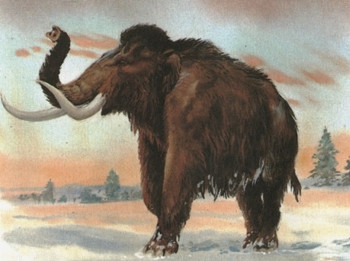(单词翻译:单击)

To find the answers, we need to rewind history around 14,000 years to a time when the first people set foot in North America. The continent was about to undergo a profound change, a change these new arrivals may have played a part in.
为了找到答案,我们需要重新回顾14000年前的历史,那时,第一批人类踏足北美大陆,而大陆也即将经历一次深刻的变化,这个变化就是由这些新的到访者带来的。
Throughout the ice age, North America was home to a variety of giant creatures. But in little more than a thousand years of the first humans’ arriving, almost two thirds of the largest animals were extinct.
在整个冰河时代,北美都遍布各种大型生物。但是就在人类踏足北美大陆一千年多一些的时间后,二分之三的大型动物都已经灭绝。
What role did people play in this mass extinction? To learn about their lives, you have to look at the clues they left behind.
大型生物灭绝的范围如此之大,人类在其中起了怎样的作用?想要知道他们的生活,你就必须从他们遗留下来的痕迹中寻找线索。
Archaeological finds tell us that the first people in North America had an advanced Stone Age technology. They were master of flintknappers meticulously chipping and sharpening pieces of flint to make spears and cutting tools. From the examples they left behind, it's obvious they were well equipped to hunt.
考古学发现告诉我们,北美洲第一批人类具有先进的石器时代的技术。他们擅长用打火石精细雕刻,用尖利的碎石片制作长矛以及削制工具。从他们留下的工具来看,很明显,他们打猎时很好地利用了这些工具。
And we know from spear points found alongside mammoth remains that these hunters tackled even the biggest beasts on the continent. Mammoths would have been a prized source of protein, providing enough meat to feed their families for weeks. The hunters probably worked in pairs or small groups. Any mammoth straying from its own herd would have been singled out.
从猛犸象化石上的长矛凹痕我们可以看出,这些猎手们甚至可以扑杀北美大陆体型最大的生物。猛犸象肉蕴含丰富的蛋白质,扑杀一头,便能喂养他们的家庭数周。这些猎人们可能几个人一组或多个人一组。任何离群的猛犸象都可以成为他们的猎物。
英文文本来自普特英语,译文属可可原创,仅供学习交流使用,未经许可不得转载。


